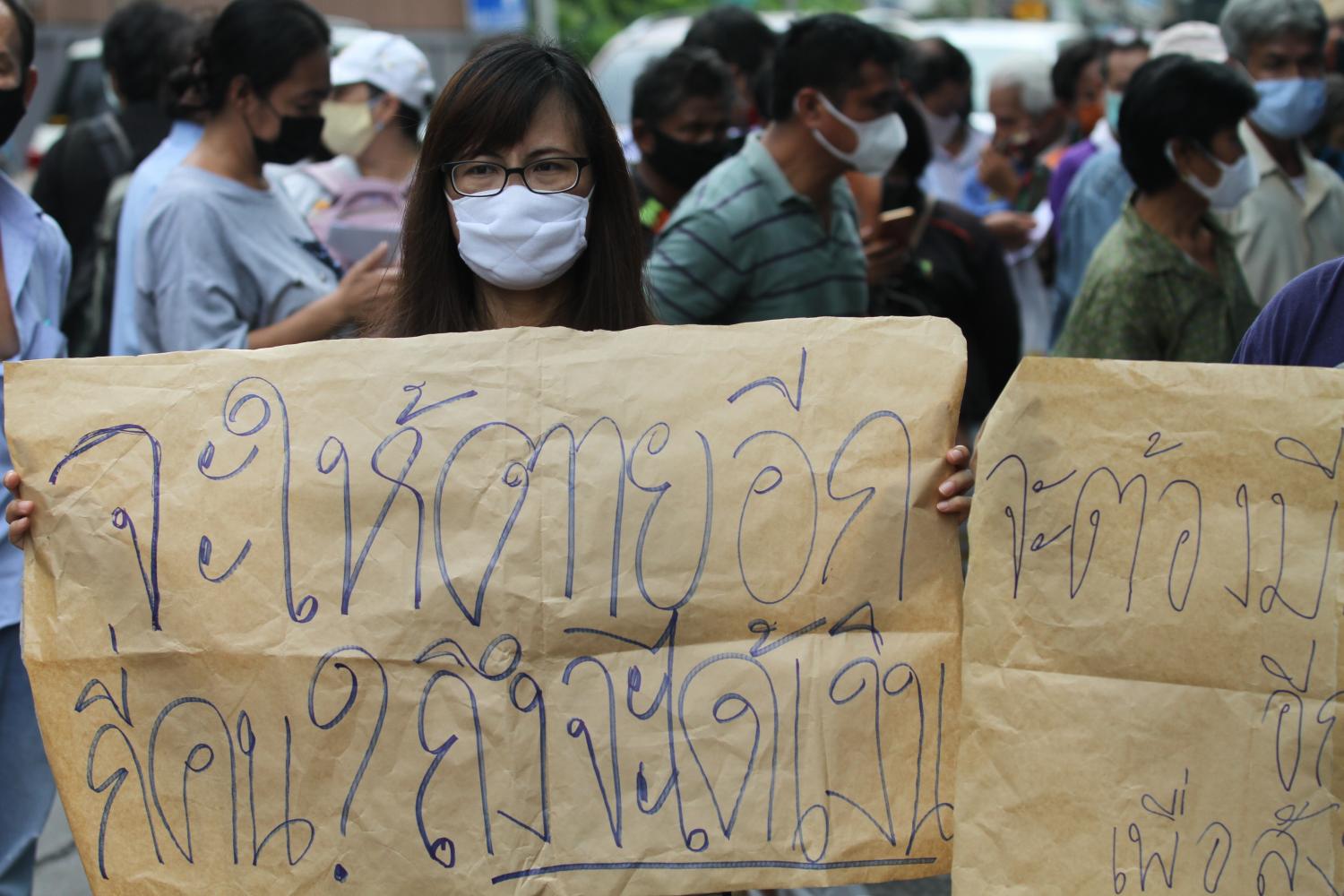
Suicide has become a hot-button issue after a group of researchers recently released a report on the impact of Covid-19 on the urban poor.
The report contains statistics which show the number of suicides related to the disease are as high as the number of deaths from the disease itself.
Anti-government critics pointed to the statistics as indicating the government's failure to care for the socially disadvantaged, while government supporters accused the researchers of misusing the statistics to embarrass the government.
The battle came to a boiling point a few days ago following the suicide of a young woman. The 19-year-old, who worked as a security guard, posted her pencil drawing of Gen Prayut Chan-o-cha and a message lamenting the hardship of living and her inability to buy milk for her child.
In response to criticism of the inadequacy of the government's cash-relief programme being the cause for the suicide, some government supporters resorted to insulting the young woman. "With her drawing ability, she should have been able to earn enough to buy milk for her child," said one.
After it was revealed that 5,000 baht in government aid money had been deposited into the young mother's account earlier, supporters launched a barrage of attacks against the government's foes and further ridiculed the suicide victim.
Meanwhile, Dr Taweesilp Visanuyothin, spokesman for the government's Centre for Covid-19 Situation Administration, came under fire for making "an insensitive remark".
Responding to a reporter's question regarding the young woman's suicide, he said it was "not unexpected", which critics took to mean it was nothing to be concerned about.
At a later news briefing, the spokesman clarified that while suicides are of great concern, their rates usually shoot up during times of stress, such as during the 1997 financial crisis. Therefore, it was to be expected that the Covid-19 pandemic would lead to more suicides, he said.
The heightened public attention to suicides not only reflects the political polarisation that continues unabated even after the coronavirus crisis but also the real hardship -- economically, emotionally and otherwise -- that puts tremendous pressure on a great number of Thai people.
Taking one's own life is, of course, the ultimate sacrifice one could make for whatever reason. In many instances, it leaves people behind feeling guilty and pondering what motive could have led to it, as well as whether a timely intervention could have turned things around.
Official statistics show that Thais commit suicide at a rate of 6.0-6.5 per 100,000, averaging out at about 4,000 people a year. Significant hikes were noted during the few years following the Asian financial crisis in late 1990s.
The leading cause of suicide is personal relationship failure, although many are attributed to mental health problems such as depression.
In the past, Thais with depression usually suffered in silence because of the stigma attached to it. Sufferers often refused to see mental health specialists for fear they would be branded crazy or insane and laughed at.
There are social hazards associated with those brave enough to reveal their conditions, especially public figures.
"Sai" Inthira Charoenpura, a well-known actor and singer, is among a small number of people who openly admit to suffering from depression. She often posts anecdotes of her fight against the condition online, an act appreciated by her followers, many of whom confess to suffering the condition themselves.
Her strong political views, however, have landed her in hot water with opponents who often bring up her depression to ridicule her.
But even friends of depression sufferers do not always know how to react in a way that comforts rather than condescends. This only goes to show that most Thais have little understanding of depression as a mental health issue.
There's also an underlying problem of inadequate resources, even as the number of sufferers appears to be increasing.
Government statistics show that more people have sought counselling in recent years. Some experts say it's a good sign that there's more recognition of mental health conditions.
Officially, fewer than two million people, or less than 5% of the population, are suffering from depression, and women tend to be afflicted more often than men.
But the actual figures are likely to be much higher because the symptoms are not widely recognised and sufferers are deterred from seeking treatment because of social stigma.
Currently, only a few organisations are publicly known to provide counselling services. These include the Department of Public Health, The Samaritans of Thailand and some services associated with a number of public hospitals and universities.
There's a danger that without fresh initiatives to actively promote understanding and provide better access to counselling, the problem could balloon into a serious social issue.
The world is currently undergoing transformative changes as a result of technological disruption, climate change and yawning social and economic disparities, among others.
New and future generations look set to face an increasingly uncertain and hostile environment. With Thailand at the top of the list of countries with the highest level of social inequity, we can expect to see an uptick in depression and other mental health issues.
It's time to get prepared and not to wait until it hits us like a pandemic.
